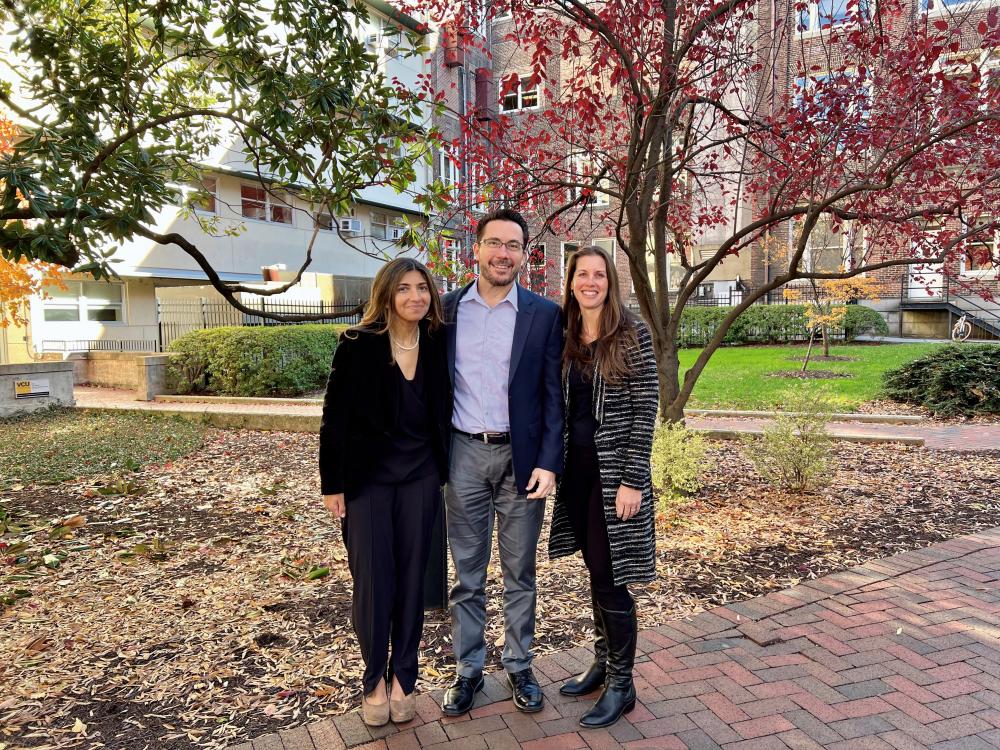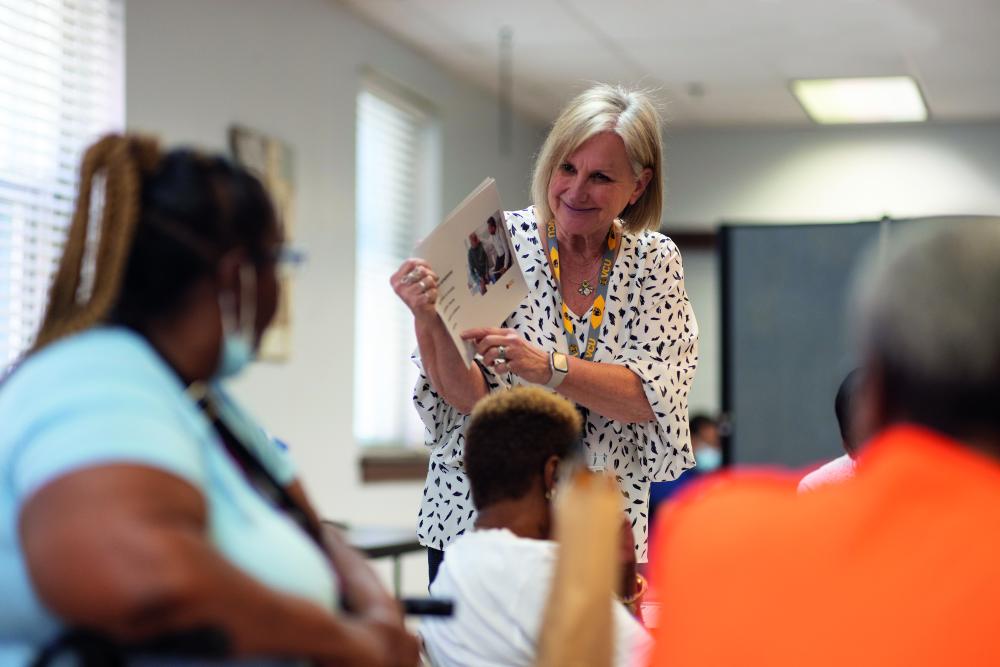Minding the Gap: VCU Richmond Brain Health Initiative

Editor’s Note: This story originally appeared in the summer 2023 issue of NEXT magazine.
By Holly Prestidge
Trina Jones and Pam Hedgespeth flanked their mother, known as Miss Sadie, as the trio sat inside an exam room at the VCU Health Ambulatory Care Center on a spring morning earlier this year during a follow-up geriatrics appointment.
The stylishly dressed matriarch, who is 91, sat quietly as her daughters shared that among the hardest parts of taking care of someone who has dementia is understanding that it never goes away; that over time, the individual they know slowly becomes someone they don’t.
They saw the signs in recent years, first in other family members, then their mother. They felt the occasional wrath, as they called it, from her mood swings, instances that the sisters and their siblings disregarded in the moment but now see very differently.
As Hedgespeth and Jones sit with their mother, they can’t help but wonder about their own futures. Jones, especially, worries about the unknown.
In the last year, however, a light has pierced their darkness.
Hedgespeth and Jones receive one-on-one counseling and ongoing caregiver support through a multidisciplinary program called the VCU Richmond Brain Health Initiative.
The RBHI, as it’s widely known, provides dementia-related screening, education, coaching, referrals for support and monitoring, and research opportunities in Richmond, which some call a dementia desert for its lack of brain health and memory care centers. RBHI particularly targets areas of low-income, largely Black and African American communities that are disproportionately affected by long-standing economic and social conditions that leave residents without adequate health care options.
The idea is to find a way, through community-based health care, to bring medical care and resources to those who don’t have access…
Brian Berman, M.D., professor of neurology with the VCU School of Medicine and director of VCU’s Parkinson’s and Movements Disorders Center
In short, RBHI offers direct, no-cost care coordination and navigation that connects individuals living with dementia or who are at risk of it and their caregivers to the appropriate brain health resources, as well as educational, emotional and lifestyle risk health coaching.
Jones learned of RBHI through VCU’s Richmond Health and Wellness Program, an early predecessor of RBHI that today remains one of its many partners. For the first time, the sisters are learning about dementia, its related symptoms and risk factors, and what they can expect with their mother. They’re also learning how they can prevent its onset as they age.
Maybe most importantly, though, Hedgespeth and Jones learned that through RBHI, they have caring professionals on their side — and on speed dial at a moment’s notice — who stand at the ready to walk this journey with them.
DEMYSTIFYING DEMENTIA
Dementia is the umbrella term for a group of symptoms related to brain disease that result in impairments in cognitive functions and affect one’s daily functioning. The myth is that dementia is a normal part of aging, but it’s not.
While many associate dementia with memory loss, the disease manifests in other ways, including loss of communication and language, the inability to focus and pay attention, lack of reasoning and judgment, and trouble with visual perception.
That could look like any number of things, from getting lost or wandering, problems recognizing friends and family, emotional flatness or the opposite, emotional outbursts, to insomnia, difficulty speaking, having trouble following orders, hallucinations or delusions, loss of coordination and more.
There are several types of dementia, including frontotemporal, Lewy body and vascular dementia, though the most widely recognized is Alzheimer’s disease, which kills more people across the U.S. than breast and prostate cancers combined.
An estimated 6 million people were living with Alzheimer’s in 2022, though its grasp goes beyond those diagnosed; more than 11 million people provided unpaid care for loved ones with Alzheimer’s or other dementias last year at a cost of about $272 billion.
In Virginia, it is estimated that more than 300,000 people above age 45 are living with cognitive decline, though nearly half of them have not talked to their doctors about their concerns.
Research shows that dementia’s risk goes up from lifestyle factors like lack of physical activity, obesity and diabetes, excessive alcohol use, smoking, depression, social isolation, hearing loss and more.
While there is no cure, modifying unhealthy habits can substantially reduce the risk of dementia. Additionally, in a very small percentage of dementia cases — roughly 2% to 5% — the cause is reversible and can be treated. Hearing loss, for example, is a treatable risk factor.
But for Black and African American adults and those who live in low-income communities, the stats are bleaker.
Black adults are twice as likely to develop dementia as whites yet are less likely to get treatment. They have the highest prevalence of dementia-related disabilities and mortality, at nearly 15% of those over age 65.
Enter the RBHI — the origins of which began a decade earlier when VCU created community programs to address health disparities for older adults in Richmond’s most vulnerable communities.
The Richmond Health and Wellness Program (RHWP) was established in 2012 to serve older adults in low-income housing through weekly, on-site wellness clinics. That was followed in 2016 by the VCU Center of Inclusion, Inquiry, and Innovation: Health, Wellness and Aging Core, or iCubed HWA, which expanded on RHWP’s health services and programming.

From those early programs, brain health and memory care emerged as areas of need. Surveys within some of Richmond’s low-income communities revealed that 71% of participants reported recent memory problems and 77% indicated a self-perception of being at risk for dementia. Memory screening and brain health education were cited as the most requested services by participants, at 67% and 63%, respectively, and another 41% requested direct caregiver services.
Within this population, nearly 20% of participants were at risk of losing housing within two months, and more than half reported having health issues identified as risk factors for dementia, including hypertension, depression and anxiety and insomnia.
“I was totally surprised by the community’s response,” said Faika Zanjani, Ph.D., associate professor in the Department of Gerontology at the VCU College of Health Professions and one of three RBHI co-directors. “They wanted to do more, but there wasn’t a place to send people with brain health referrals.”
Thus RBHI was established in 2020. Its team spans a variety of departments and schools on the MCV Campus, including gerontology, nursing, geriatrics and neurology.
Dr. Zanjani collaborated with RBHI co-directors Lana Sargent, Ph.D., associate professor in the VCU School of Nursing and affiliate faculty in the School of Pharmacy’s Geriatric Pharmacotherapy Program, and Brian Berman, M.D., professor of neurology with the VCU School of Medicine and director of VCU’s Parkinson’s and Movements Disorders Center.
Their team also includes Cate Newbanks-Hawks, a gerontology health coach with RBHI, and Kennedy O’Donnell, RBHI interventionist.
“The idea is to find a way, through community-based health care, to bring medical care and resources to those who don’t have access, and to provide a system that reaches out to them and screens them for cognitive issues or risk factors,” Dr. Berman said. “Then those individuals are offered health coaching and care coordination and navigation to connect them to providers and other services.”
While RBHI’s intention is to reach out directly to community members, individuals can also be referred to its program by providers or other health services. Screenings consider an individual’s cognitive and overall health, but also factors like housing and food security, in-home safety, socialization and engagement, caregiver status, health care and medication adherence and more.
Together we are championing change in Richmond to create brain health spaces. As an academic health system, we are well-equipped and passionate about using science and creating innovation to support brain health in our local community.
Faika Zanjani, Ph.D., associate professor, Department of Gerontology, VCU College of Health Professions
Once individuals are identified, much of the program — from coaching to navigation and consultation — is carried out by telephone, Dr. Sargent said. Simply put, it’s the best way to reach many older adults.
“It reduces barriers like transportation, especially for older adults who are having to use family members to transport them from place to place or who don’t have transportation and can’t afford pricey transportation services,” she said.
RBHI was further bolstered in 2021 by a three-year, $1.2 million grant from the U.S. Department of Health and Human Services’ Administration for Community Living. In addition to its VCU partners, it works with outside organizations including Riverside Center for Excellence in Aging and Lifelong Health, the Area Agency on Aging: Senior Connections, Greater Richmond Alzheimer’s Association chapters and more.
The partnerships expand a much-needed network and safety net for many who might otherwise fall through the cracks of the health system.
O’Donnell, the RBHI coordinator and interventionist, said much of his work centers around establishing a base of care that can often ward off problems for those at risk or provide some relief for those who have already been diagnosed and their caregivers.
“When we talk to people we meet through the community, our primary goal is always making sure that they have a stable relationship with a primary care provider first, because that can solve a lot of issues,” O’Donnell said. “But if a patient lacks those supports, we establish a care network for that person — it’s all about establishing a base of care.”
COMMUNITY CARE
Earlier that week, a few days before Miss Sadie and her daughters’ appointments, about a dozen residents of a low-income apartment community in the heart of Church Hill opened sealed brown paper bags and dug around inside before pulling out items to inspect them.
The bags were filled with a variety of items: whole grain granola and fruit bars, packets of nutty trail mixes, single-serve green tea teabags, dark chocolate candy and grass-fed beef jerky sticks, but also stretchy bands intended to facilitate armchair exercises, reflective neon bracelets that could be worn and seen in the dark, and small pillboxes.
As residents traded snacks or began eating, Newbanks-Hawks, a health coach with RBHI, walked the room handing out plums and bananas and cans of flavored sparkling water.
This event was a first for RBHI, though Newbanks-Hawks is no stranger to Church Hill House. She typically spends her Wednesdays there, talking with residents about their health needs, cognitive and otherwise. On this day, however, she was running a program about brain health.
The snack bags were an icebreaker, but also a tool. She explained how eating right was just one way that individuals could help themselves reduce dementia risks.
“We have to know that every part of our body is affecting what’s happening in our brains,” she said. “If you’re not taking care of your gut and your heart and your blood, you’re not taking care of your brain. You can’t take care of one part without taking care of another part.”
Newbanks-Hawks explained frankly that Black and low-income populations have an especially high risk for developing dementia, and particularly so if they live in areas without access to healthy foods and medical care.
Those sitting in front of her nodded their heads in agreement. Some called out their various chronic issues as Newbanks-Hawks talked about them, like diabetes and hypertension. Others aired concerns about the lack of information they receive from doctors. Some of those in the crowd were already working with Newbanks-Hawks one-on-one in her Wednesday sessions.

“We can change our risk factors if we start leading healthier lives as soon as we can,” she told the group.
Dr. Berman emphasized that dementia is among the most feared diseases.
“Polls among those over age 55 show people are more afraid of dementia than cancer,” he said. “The fear from patients comes from their perceptions about the loss of independence and freedom, being deprived of care or not being taken seriously by providers, social stigmas, shame, isolation and more.”
Education is key, and it is a fundamental pillar of RBHI’s mission.
“When you can’t engage with your outside environment, it changes the way your brain is able to function,” Dr. Sargent said. “You’re not getting the same stimulus that you had before, so you can start to experience memory loss, loneliness, depression, and all of those things show up as cognitive issues.”
Dr. Zanjani said the early investigations into community-wide needs only underscored RBHI’s efforts to build a program to meet them.
“Our work started as feasibility, to see if the community was interested, and we found out they were much more than interested,” she said. “They are invested in creating positive change to reduce dementia burdens in the community.”
“Together we are championing change in Richmond to create brain health spaces,” she added. “As an academic health system, we are well-equipped and passionate about using science and creating innovation to support brain health in our local community.”
For at least two people, RBHI and its mission means the world.
Like many caregivers, Hedgespeth left her job so she could take care of her mother full-time. Jones steps in when her sister needs a break.
They have regular phone calls with RBHI team members as well as scheduled in-person appointments.
“We have Kenny on speed dial,” Hedgespeth joked, referring to O’Donnell, the program’s interventionist. “Having the caregiver support has been awesome.”
The two women said they are learning a lot through the program’s support, including that their mother’s emotional ups and downs are part of the disease.
“It’s not personal, and it’s not a choice,” Jones said. “There’s no reason to be angry — why would I be angry at this person who sacrificed everything for me for the first 18 to 21 years of my life?”
Still, as dementia affects everyone differently, the sisters are taking each day with their mother as it comes.
“We really didn’t understand or know what was going on with her,” Hedgespeth said. “As we saw Mom progressing down that road, we really wanted to understand how we can help her and be supportive of her.”
Hedgespeth said her mother objected at first to the care.
“She was saying she didn’t want to be a burden,” Hedgespeth said, “but she’s not a burden. I’m going to do this for her for as long as I can.”
Categories Faculty and Staff, News, Research